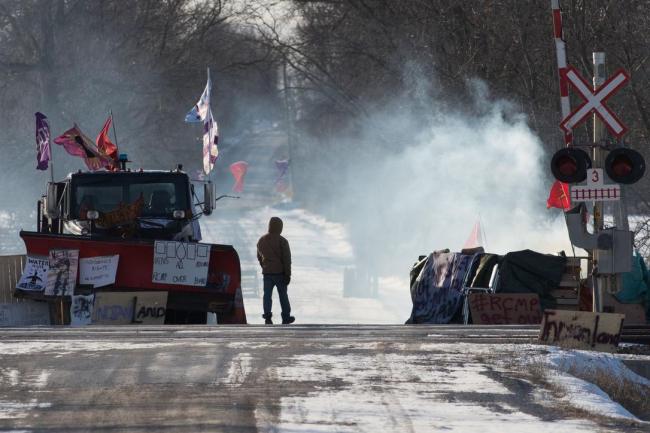Articles Menu

Export Development Canada (EDC) confirmed to the Star that it is considering a loan to TC Energy and its partners to help build the 670-km natural gas pipeline that has inspired demonstrations across the country in solidarity with Wet’suwet’en hereditary chiefs who say the project can’t proceed without their consent.
Jessica Drake, a spokesperson for EDC, said in an email that the credit agency couldn’t comment on its potential financing decision before an agreement is signed. The agency posts transactions under consideration on its website at least 30 days before striking a deal, she said. The financing of Coastal GasLink was posted Jan. 27.
“It’s important to note that EDC is considering providing a loan in the form of project financing to Coastal GasLink and would not be ‘investing’ in the project,” Draker wrote.
“EDC does not provide grants or subsidies.”
The potential loan comes as the federal government grapples with the fallout of rail blockades that have choked the flow of goods and train passengers across much of the country, as CN Rail and VIA collectively announce they will lay off 1,500 as traffic is stalled. The dispute erupted earlier this month after Royal Canadian Mounted Police arrested demonstrators blocking construction crews from working on the Coastal GasLink.
Chief Na’Moks, one of five clan chiefs of the Wet’suwet’en nation whose English name is John Ridsdale, questioned the timing of the potential loan from EDC.
“It is highly inappropriate at this time,” Na’Moks told the Star after learning a loan is being considered.
“When we’re supposed to have discussions and then for them to put this out — it’s almost like they’re trying another avenue to ensure that the public believes that this will happen when we’re adamantly opposed to it,” he said.
The $6.6-billion pipeline project is already approved by the government of British Columbia, and the company building it has signed 20 benefit-sharing deals with First Nations band councils along the route, including five that are part of the wider Wet’suwet’en nation.
But hereditary chiefs have argued those councils don’t have authority over the nation’s entire traditional territory, which spans 22,000 square kilometres in northern B.C.
Na’Moks told the Star that hereditary chiefs of the nation’s five clans are united in their opposition to the pipeline, and called on the RCMP enforcing construction and Coastal GasLink employees to leave Wet’suwet’en territory.
EDC is an arms-length corporation owned by the federal government. Its mandate is to boost exports by supporting Canadian companies pursuing sales in other countries. The Coastal GasLink would carry natural gas from northeastern B.C. to a terminal at Kitimat, where a conglomerate of corporations are constructing a $40-billion export terminal that Ottawa has boasted as the most expensive private sector project in Canadian history.
In a written statement, Ryan Nearing, press secretary and regional adviser to International Trade Minister Mary Ng, stressed that EDC is a “self-financing” Crown corporation that “operates at arms-length” from the government.
He did not answer questions about the appropriateness of the Crown corporation’s potential financial support of the Coastal GasLink as the government tries to resolve disputes with opponents of the project.
“The absolute priority of our government remains to see a peaceful and quick resolution of this situation,” Nearing wrote.
“As always, we continue to expect EDC to be fully transparent and accountable for their transactions. We will ensure EDC continues to meet the needs of Canada’s exporters and upholds the values that Canadians expect.”
In response to a request for comment from the Star, TC Energy pointed to comments made by executives during a conference call Feb. 13. According to the transcript, chief executive officer Russell Girling said the company will finalize financing the pipeline’s construction with “a syndicate of banks to fund up to 80 per cent” of the project’s expenditures while it is built.
It has also announced it plans to sell a 65 per cent stake in the project to American investment firm KKR and the Alberta Investment Management Corporation as it continues to work with First Nations on an option to acquire a 10 per cent interest in the project.
“Both of those transactions are expected to close in the first half of 2020, and will substantially satisfy our funding requirements through the project to completion,” Girling said on the call.